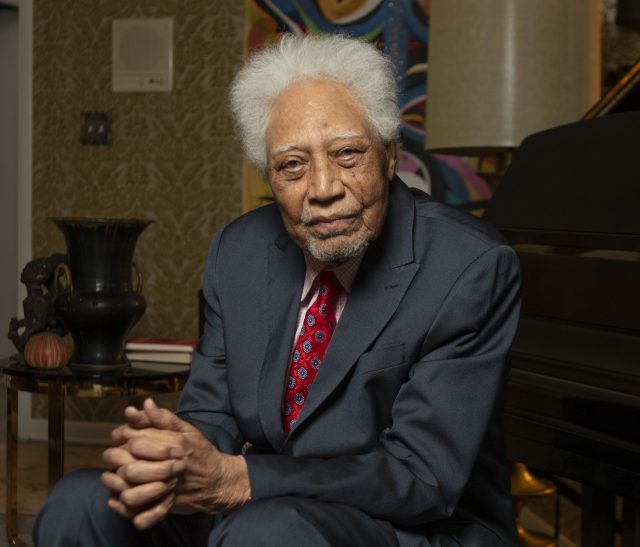
By Barnett Wright | The Birmingham Times
Birmingham business legend Dr. Jesse J. Lewis Sr., who turns 100 years old on January 3, 2025, is sitting quietly inside his Smithfield, Alabama, home talking about not what he’s accomplished over the past century but what’s ahead.
“I haven’t done enough exercise, but I’m working on that,” he told The Birmingham Times in a nearly two-hour interview at the home he has lived in for nearly 50 years. “It’s not as easy as it used to be.”
It’s all about stamina, Dr. Lewis said.
“I’ve never been great. I’ve always been good. I’m average, but I do it good enough. Whatever I start, I do it good enough. Whatever it is I’m doing, I work at it hard.
“I play golf with some guys that play like [world champions],” he continued. “I just beat them, but I beat them because I work at it and they don’t work at it. … I’m good at developing some stamina for whatever it is I have to do.”
One thing Dr. Lewis hasn’t had the stamina—or patience—for is a 100th birthday party. His wife, Brenda, wants to throw one for him. He doesn’t want one.
“We started putting the list together, and it got to be over 300 people and … you miss people. That’s the worst thing in the world,” he said.
“History Maker”
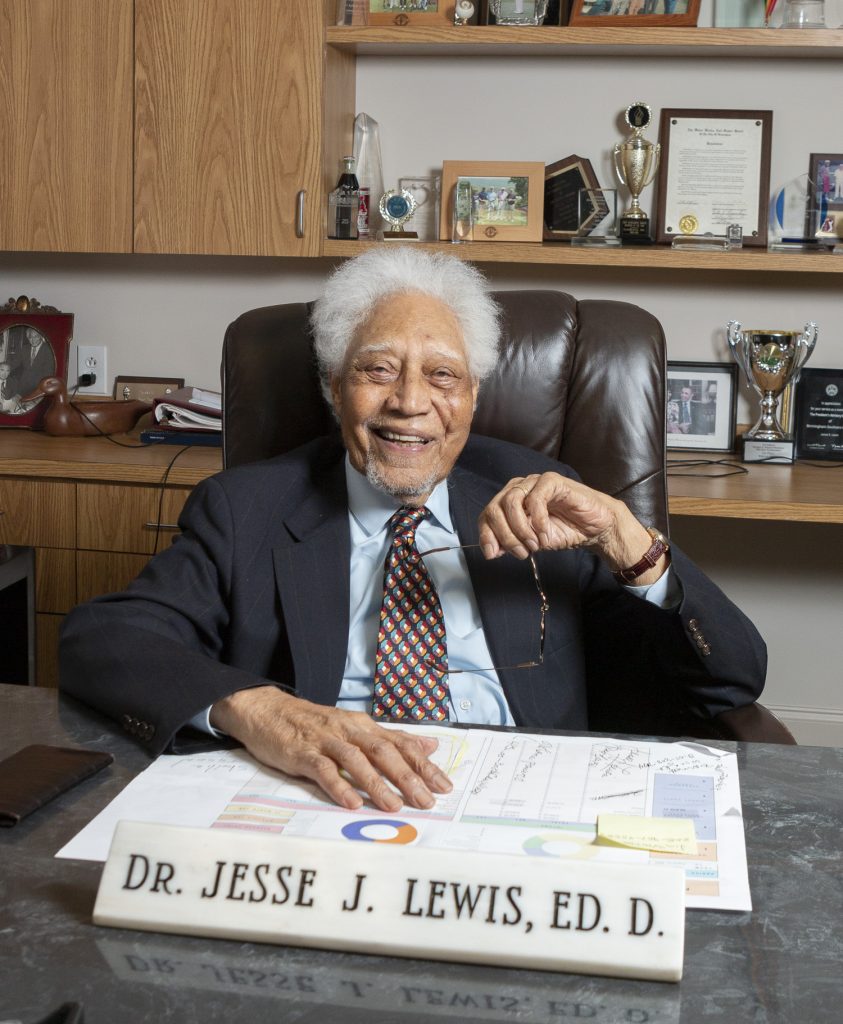
A high school dropout, Dr. Lewis turned hard work into earning five degrees, including a doctorate, and serving as the president of a college in Alabama. He has owned or been part of at least 17 different Birmingham businesses, including ventures in real estate and music publishing, as well as a recording studio, a golf course, radio and television stations, grocery stores, and night clubs. He founded The Birmingham Times newspaper in 1963 and sold it in 2015.
In 2024, Dr. Lewis was inducted into the University of Alabama’s Communication Hall of Fame. In 2023, he was inducted into the National Association of Black Journalists Hall of Fame. In 2022, he was presented with a Lifetime Achievement Award from the Vulcan Park Foundation. And he’s been in the Birmingham Business Hall of Fame since 2019.
Dr. Lewis opened the country’s first Black-owned public relations and advertising agency in 1954. One of his first clients was the Coca-Cola Beverage Company, which hired him to do brand marketing.
“I was the first Black person the Coca-Cola Company ever hired to represent them,” Dr. Lewis said. “I did the first ad with the Coca-Cola Company involving a Black person, the first one in the history of Cola-Cola. … It was on national, TV, radio. … In that job, I learned a lot and gained a deep passion for the marketing industry. My life took a turn toward this path, and the rest has made me who I am today.”
Claude Nielsen, 74, former chairman and CEO of the Birmingham-based Coca-Cola Bottling Company United, is one of Lewis’s closest friends.
“There is much to be admired about my favorite centenarian, but what I most admire is his unwavering determination,” Nielsen said. “For full appreciation, one has to put this extraordinary life journey into the proper context, and what we often forget about his formative youth in the late 1920s and 1930s.
“This was a period of intense poverty during the Great Depression, especially in rural Alabama where he grew up, and a period of discrimination that afforded extremely limited education and career opportunities for a young Black man. I would say his life accomplishments are unmistakable evidence that he simply would not be denied.”
Dr. Richard Arrington, the first African American mayor of Birmingham, said Lewis has been one of the most consequential figures in the city’s history.
“The city at large and the Black community in particular should recognize what a history maker Jesse Lewis has been. How he’s built bridges in this community. How he’s quietly but effectively kept the community aware of political and civic developments, and how he’s gone about in a quiet and constructive way. He’s had a gift of what I call business ingenuity,” said Arrington, who was elected mayor in 1979 and served until 1999.”
Helping People
As Dr. Lewis sits comfortably in his living room, he goes over a typical day for him. He usually gets up between 9 and 9:30 a.m. and has a large breakfast with his wife. While enjoying a full breakfast of bacon, eggs, grits, pancakes, fruit, and juice, the couple discusses current events or sports mostly. After breakfast, Dr. Lewis will either spend time on the sun porch or head to his office at the Jesse J. Lewis Jr. Tech Center—named after his son—while his wife, who also has a Ph.D, heads to the Agency 54 Advertising Firm, which they own. Around 4 p.m., she’ll swing back past his office to pick him up.
There may be an occasional doctor’s visit, but that can be rare.
“I’m not sickly. … To know that you have lived so long and, most importantly, healthy is great,” said Dr. Lewis. “I’m not as great at golf as I used to be, [but] I can still play. That makes [me] feel good.”
Whenever he’s out, Dr. Lewis is treated like royalty. His wife said she sees it nearly every day.
“When we go out people rush up to him and say, ‘Oh, Dr. Lewis, you helped my daughter get through Lawson [State Community College, where served as president from 1978 to1987],’ ‘You did this for me,’ ‘You did that for me.’ That is really heartwarming,” Brenda Lewis said. “[People], mostly women, ask, ‘Can I take a picture with you?’ I just step to the side.”
Dr. Lewis said the joy of his day is finding ways to help people. “I’ve never passed by anybody with a cup unless I put something in it,” he said. “I don’t care whether they’re lying about, whether they need it or not. I don’t care. I know some of them are [lying, but] you have to take care of all because you don’t know which one is telling the truth.”
After a day out and about, the Lewises return home. Dr. Lewis is not a big dinner person, but he loves desserts.
Brenda Lewis said, “He loves Neapolitan, [vanilla, chocolate, and strawberry], ice cream that comes in the big tub. Or I’ll make a pie or pick up something from the bakery. I’m always thoughtful about what he’ll want for dessert.”
Most nights, Dr. Lewis goes to bed between six and seven. If he’s watching a sports event on TV, he may turn in a little later.
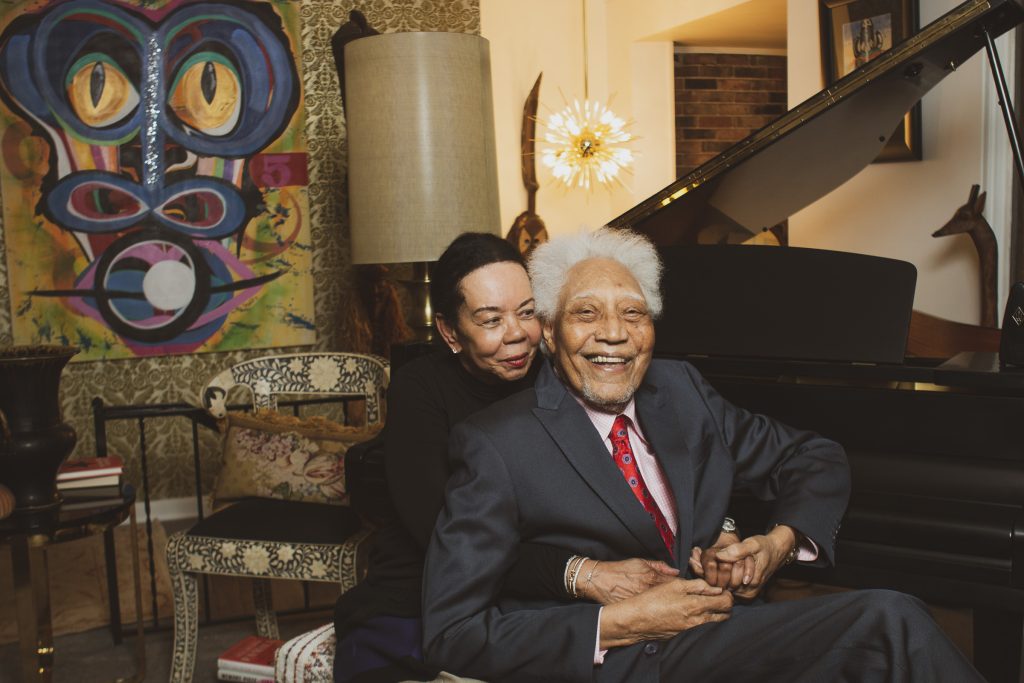
Jesse James Lewis
Dr. Lewis was reared by his grandmother, Sarah Davis. According to her, he was born Jesse James Terror in Northport, Alabama, on Jan. 3, 1925.
Dr. Lewis’s grandmother raised five children, including him; he was the oldest. All were expected to find odd jobs to make pennies and nickels to contribute toward the family’s survival—and this was before they turned 10.
The Lewis family lived in a small, three-bedroom shotgun house. His larger-than-life grandmother had the children do two things every day, Dr. Lewis said: “The first was to pray and thank God for what you had. The second was to sit down for Bible study.”
“Everything in the Bible was the law,” he added. “This is what God wrote, and this is what he wanted you to do. There were some words I couldn’t read, but I would read the word before and the word after and try to get an idea of the meaning of the word I didn’t understand.”
As Dr. Lewis matured, he learned something else about his grandmother: she couldn’t read or write.
“The reason why I know that is one day one of the kids couldn’t understand the scripture, and she asked [grandma] to read it,” he said. “She had to ask me. She didn’t want us to know she couldn’t read. She made us sit down at night, and the one who could read the best read to the rest of us.”
Even now, Dr. Lewis thinks about his grandmother.
“Here was a woman who probably went to school at the most 10 days during her lifetime,” he writes in his book titled “One Man’s Opinion: We Can Do This Together,” published in 2020. “She would be amazed to see her ‘Little Jesse’ having five degrees hanging on his office wall. The one I am most proud of is my high school certificate.”
Dr. Lewis’s degrees include a Bachelor of Science in accounting and business administration from Miles College, a Master of Science in criminal justice from Troy State University, and a Doctor of Education from Atlanta University, now Clark Atlanta University.
His connection with Miles College remains special.
“Dr. Lewis has provided resources and opportunities for the students and alumni of Miles College, and we remain thankful for his continued support,” said Bobbie Knight, J.D., President Miles College. “Dr. Lewis earned his degree in accounting and business administration from our beloved institution upon his return from the war. I believe it is safe to say Miles College is where he found his love for marketing and advertising during a period when the marketing and advertising space lacked diversity. Dr. Lewis opened one of the first Black-owned advertising agencies in the nation … an instrumental resource of information then and now for the city of Birmingham and beyond.”
His enrollment at Miles College would prove career- and life-changing in several ways—including an interview that would lead to a lifelong friendship with Alabama Gov. George Wallace, the notorious segregationist, Lewis said.
“When I was a student at Miles College, working at the school newspaper, I had the fortunate opportunity to interview [Wallace],” Lewis writes in his book. “Wallace had a reputation for being a racist and I could have made the decision not to interview him. However, I agreed to do the interview and in talking with him one-on-one, I gained an insight that would benefit me for the rest of my life.”
Lewis said he got a chance to see a side of Wallace that no other Black person did.
“As we talked, the two of us developed a better understanding of one another, one which grew into a lifelong personal relationship that lasted from that day until his death [in 1998],” he writes.
In 1975, Lewis was appointed to head Alabama’s Office of Highway and Traffic Safety, the first African American to serve in Wallace’s cabinet. Over the years, Wallace stuck with Lewis and, as an ex-officio member of the Alabama Board of Education, helped appoint Lewis president of Lawson State Community College in 1978, a position Lewis held until 1987.
Miles College was meaningful for Lewis in another way, as well. He recalls in his book, “I had a marketing professor named Paul Harris who I highly admired. He said to me then, as student, that I was going to be successful. Not because I was smart or ambitious, but because I didn’t have enough sense to know what I couldn’t do.”
Military Service
After completing the 10th grade, Dr. Lewis dropped out of school to enter the military, where he served from 1942 to 1945.
“While in the military, I served in the 183rd Engineering Combat Battalion under Gen. George S. Patton, who was my Army commanding officer,” he writes in his book.
During his time in the U.S. Army, Dr. Lewis embarked on the first of his many business ventures.
“I cleaned and pressed shirts and trousers for my fellow servicemen. I would charge them by the month, either $1 or $2, because none of them had any money until they got their checks,” he said. “This little money came in handy because I would send all of my service pay back home to support my grandmother in Alabama.”
After three years in the military and an honorable discharge, Dr. Lewis returned to Alabama, where he accepted a job for a rubber company in Tuscaloosa. After working there for two years he was fired, and that inspired him to start his own business.
“That way if anybody would ever fire me, it would be me,” he said.
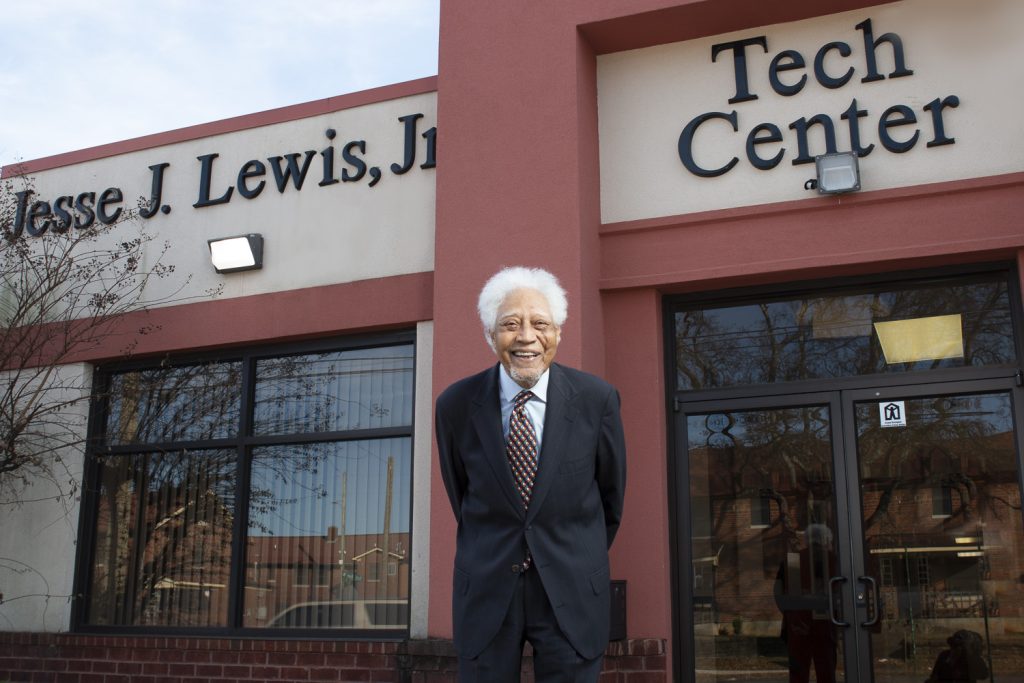
The Birmingham Times
Among the many businesses Dr. Lewis started was The Birmingham Times newspaper, which he founded in 1963 because he felt there was no voice to speak for the Black community.
“I was under the impression that the Black community needed an instrument that recorded history as it relates to the struggles and injustices imposed upon it during the Civil Rights era and even before,” Lewis said.
It may be surprising for some to learn that neither Dr. Lewis nor his newspaper had much to do with the Civil Rights Movement, which was making national and international news, as the Rev. Dr. Martin Luther King Jr. and the Rev. Fred Shuttlesworth led the fight to dismantle segregation in America, starting in Birmingham—Alabama’s largest and most racist city at the time.
“My concern was always economics,” Dr. Lewis said. “I concentrated on that. I’m a firm believer that economics is the key to success. That will determine how well you are accepted in the community. I may be wrong, but that was my concentration.”
Family
Dr. Lewis credited his business success to his wife of 62 years, Helen, who died in 2016. Lewis and his wife raised two sons.
“They were the joy of our union,” he said.
Dr. Lewis writes in his book: “Both boys were smart, handsome, and highly educated. … I have lost both of them, and I am the only one living now. My youngest son, [Jesse J. Lewis Jr.], was killed in a tragic automobile accident in 1995; my oldest son, [James Lewis Sr.], died of cancer [in 2013]; and my wife passed away [three] years later. Those were some of the saddest days and most painful days of my life.”
After his wife, Helen, passed, “It took me almost a year to get my thought processes back together,” Dr. Lewis writes in his book. “What helped revive me was knowing that she would want me to keep going.”
In December 2022, Lewis and the former Brenda Dickerson got a marriage certificate and married on Feb. 4, 2023. It was his second marriage and her fourth.
Speaking about his wife, Brenda, Dr. Lewis said, “She loves people. She will make a sacrifice for somebody else with whatever she has.”
“I love people, but I’m not making a sacrifice,” Dr. Lewis added with a laugh.
Brenda Lewis said, “I really got to know him from talking. Not from physically being with him but from talking to him, so I got to know him as a person and found him incredibly smart. His intellect is what attracted me to him. He’s a romantic, and he’s entertaining.”
The Lewies seldom disagree. The topic of a100th birthday party for Dr. Lewis, however, has been up for debate.
“You have to decide whether it’s going to be something grand or something intimate,” Dr. Lewis said. “Something grand was over 300 [people]. Something intimate was supposed to be up to 100. My wife couldn’t even get it down to 100.”
“I’m going to have a party,” Brenda Lewis said.
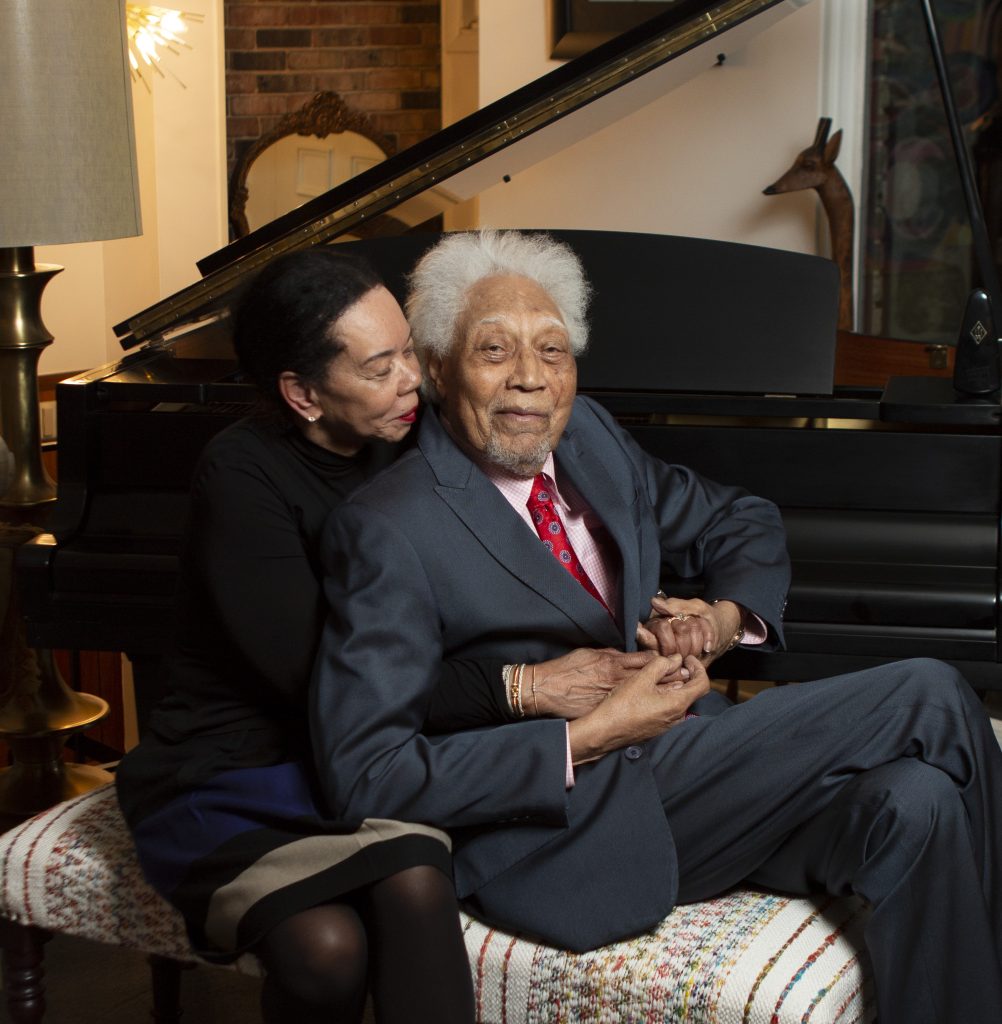
Jesse and Brenda: Love Story
Anyone who knows Dr. Lewis will say he doesn’t stay on the phone for more than 10 minutes unless a business transaction is involved. That’s why Brenda knew there was something to the nearly two-hour conversations they were having.
“Our relationship started on the phone, and then Jesse started calling me three or four times a day,” she recalled. “I was like, ‘What do you want with me now?’ He would say, ‘I never talk to anybody for more than two or three minutes because if it’s not about money I don’t want to talk.’ Eventually we would talk and talk, and one time I’m like, ‘Jesse, we’ve been on the phone for an hour and 59 minutes.’ He said, ‘I have to hang up.’”
The two got a marriage certificate in December 2022 and married on Feb. 4, 2023. It’s the second marriage for Jesse, who turned 100 on Jan. 3, 2025, and the fourth for Brenda, who is 76.
Speaking about his wife, Jesse said, “She loves people. She will make a sacrifice for somebody else with whatever she has.”
“I love people, but I’m not making a sacrifice,” he added with a laugh.
Even though she has been married before, Brenda said her husband has taught her what it’s like to be a wife.
“I’ve always been really independent, and I never really understood what it meant to be a wife,” said the former associate dean at Harvard University, who has a Ph.D. from Michigan State University. “Maybe I never loved the other three. … I wasn’t trying to cook for them or make sure the clothes were laundered. … I do it [for Jesse] because I love him so much.”
Brenda said she never thought much of those two-hour conversations with Jesse, “then it hit me—and, honestly, fireworks literally went off in my head,” she said.
“It was an unbelievable experience,” she added. “We had been talking a lot, maybe two years, and he had been flirting with me. … I called my best friend in New York and said, ‘I think I have a crush on Jesse Lewis.’ She was like, ‘That’s impossible. You’re too old to be having a crush.’ I said, ‘It’s just a crush, and a crush means it’s going to go away’—but it didn’t.”
That crush would lead to marriage and an important lesson for Brenda, she said.
“I’ve always worked, and working was the most important thing to me—a career and moving up, and you’re director of this, you become assistant dean of that and dean of this, so working was important to me. … Jesse is always saying, ‘But you’re my wife,’ and I’m like, ‘What does that really mean?’ [For me], it means taking care of him, and he says, ‘I’m your husband, and that means I take care of you.’ That’s what I’ve learned from this—no matter what, we take care of each other.”




